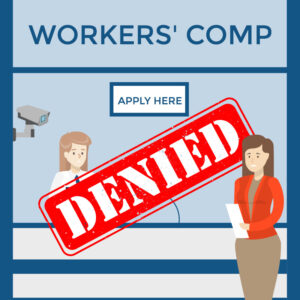If workers’ comp denies your claim, you will be liable for covering your treatment cost. This situation can be scary, particularly if you required a costly surgery, a prolonged hospital stay, or a lengthy treatment period to treat your injuries or condition. The good news is that options for dealing with this situation are available.

You can, for instance, file an appeal and collect payment for your medical bills. You can also cover your medical bills with your group health insurance or your spouse’s group health insurance. Medicaid and Medicare are the other potential options for paying your medical bills if your workers’ comp is denied. You will need legal support and representation to navigate this situation smoothly.
What to Do if Workers’ Comp Refuses to Pay for Your Medical Bills
File an Application for Adjustment of Claim
If workers’ comp refuses to cover your medical bills, you will need to file an application for adjustment of claim with your state’s Workers’ Compensation Commission (WCC). This application is what formally files your workers’ compensation claim with the commission.
You have three years after your work-related injury to file this application. If you fail to file within the specified time, the denial decision will be final, and it will bar you from receiving workers’ compensation benefits permanently.

Request a Hearing
Once you file your application for adjustment of the claim, the commission will assign a case number and an arbitrator to your case. This will enable you to move your claim forward by requesting a hearing. The hearing will be an opportunity to discuss your case with the assigned arbitrator and your employer.
Since you are dealing with unpaid medical bills, it is advisable to request an emergency hearing and get a decision within 180 days. You can do this by submitting a Petition for Immediate Hearing. Having a workers’ compensation lawyer on your side during the hearing is a wise decision.
The lawyer will ensure you have a strong claim and are ready for the hearing. The lawyer will help you understand the reasons workers’ compensation claims are denied and common pitfalls to avoid. The lawyer will also help level the playing field, especially if a team of lawyers is representing your employer.
File an Appeal
If the arbitrator decides to uphold the decision to deny your workers’ comp, you can file a Petition for Review to appeal that decision. You have 30 days from the date of the arbitrator’s decision to file this petition.
Three commissioners from WCC will receive the appeal, examine the arbitrator’s decision, and schedule a hearing date. You can submit written arguments to support your claim to the commission before the actual appeal hearing. You will have five to ten minutes to argue your case at the hearing. The commission’s decision will be ready within 60 days of the appeal hearing.
Does Workers’ Comp Cover All Medical Bills?
Workers’ comp generally pays all medical bills arising from the treatment of your work injury. These bills include but are not limited to, emergency room care, hospital stays, doctors’ visits, diagnostic studies like X-rays and MRIs, rehabilitation treatment, and medications.
The rules and procedures for approving medical bills associated with a workers’ compensation claim vary from state to state. In Illinois, for instance, workers’ comp will cover any necessary and reasonable medical treatment recommended by your doctor. Understanding these rules and other workers’ compensation laws can help you tell when employers violate workers’ compensation responsibilities.
What Options You Have if Workers’ Comp Denies Your Claim
If your workers’ comp has denied your claim, you might wonder, “what happens to medical bills when workers’ comp is denied?” The most important thing you should know is that you will have to cover the medical costs. Luckily, you do not have to pay them out of pocket. The following options might help you cover those medical bills:
Group Health Insurance
Many group health insurance providers will accept to cover accrued medical bills when your workers’ compensation case is unresolved. You can use your group health insurance policy or your spouse’s policy to pay the disputed medical bills.
You may need to complete and submit a Notice of Dispute form to the relevant group health insurance company. You may also need to agree to repay the company from your workers’ comp settlement or award and sign a repayment agreement.
Your workers’ compensation lawyer can work out a lower repayment amount with the group health insurance company on your behalf. The lawyer can also fight for a maximum workers’ compensation settlement or award.
Medicaid
Medicaid might pay for your disputed medical bills if you do not have group health insurance. This state health insurance program is available to low-income earners with limited assets. You will be required to reimburse Medicaid for any medical bills that the workers’ comp should have covered.
Medicare
If you cannot access Medicaid, you may be eligible for Medicare. This federal health insurance is available to people with disabilities. You will qualify for Medicare after getting accepted for social security disability benefits. You will, however, need to wait for 29 months from your disability date to use Medicare.
Pursuing Benefits for Medical Expenses
You must let your employer know that you have sustained a work injury to obtain workers’ compensation benefits. You should see a qualified doctor immediately after you suspect your injury or illness is work-related. The doctor will determine and document the extent of your injury.
Upon receiving your claim, your employer’s insurer will probably ask you about the injury or illness and require you to see a preauthorized medical provider for a comprehensive medical examination. The insurer will use the medical provider’s examination to figure out whether you are eligible for workers’ compensation payments and, if so, how much your claim will be worth.
You can increase your odds of getting maximum workers’ compensation benefits by knowing what not to say to the insurance adjuster. Your lawyer will guide you on engaging the insurance adjuster and mistakes to avoid while doing so.








